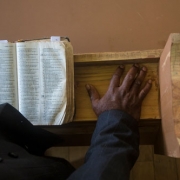Good Thoughts, Good Words
/0 Comments/in For Pastors, Preachers, Bible Teachers/by David GuzikWe have thought, O God, on Your lovingkindness,
In the midst of Your temple.
(Psalm 48:9)
I think this line from Psalm 48 is a great prayer for a preacher to pray. It’s good for us as Bible preachers and teachers to say, “We have thought, O God, on Your lovingkindness.”

Lovingkindness here translates the great Hebrew word hesed. The ESV has “steadfast love,” the NASB has “lovingkindness,” and the NLT has “unfailing love.” Maybe it’s best to see it as “loyal love” or “covenant love.”
This is what we as preachers and teachers should think more about: the wonderful, amazing, loyal love of God.
Charles Spurgeon preached a sermon on this verse, titled A Worthy Theme for Thought. In the sermon Spurgeon thought of three different people in the church and how they should each think and speak more of the lovingkindness of the Lord.
Spurgeon thought of a sister who thought and spoke all the time about her bodily aches and pains. He said, “suppose you tell your next visitor about the lovingkindness of the Lord to you.”
Spurgeon thought of a brother who was having trouble in business, and always thought and spoke about it. “Well, we know that old story; could you not change your note just a little, and talk about the lovingkindness of the Lord?”
Then he thought of a Christian who complained that there was little love in the church. “Now, henceforward, instead of always harping on the faults and failing of God’s people, — which, certainly, are numerous enough, but have not become any fewer since you talked so much about them; — would it not be better to think and talk of the lovingkindness of the Lord?”
How about us as Bible preachers and teachers? Shouldn’t we pray to think more and speak more about the great love of God? We can be consumed with our worries and comparison and fears; isn’t it better for us to think more and speak more about God’s great love?
He really loves you, and He has called you to be messenger of His love.
Blessings to You in Jesus’ Name – David Guzik
Click Here to Receive Email from David for Pastors, Preachers, and Bible Teachers
Remember to be Fruitful
/0 Comments/in Weekly Devotional/by David GuzikAnd let our people also learn to maintain good works, to meet urgent needs, that they may not be unfruitful. All who are with me greet you. Greet those who love us in the faith. Grace be with you all. Amen. (Titus 3:14-15)
These last sentences from Paul’s letter to Titus give us a few final things to remember. We can first look at the goal: that Christians may not be unfruitful. God wants us to “bear fruit” as believers.

The idea of “fruit” or being unfruitful here is a poetic way to speak of a Christian life that brings forth good things. It’s good for an apple tree to bring forth good apples, and it’s good for a Christian life to show the “fruit of the Spirit” described in Galatians 5:22-23: “the fruit of the Spirit is love, joy, peace, longsuffering, kindness, goodness, faithfulness, gentleness, self-control.”
Here, Paul says we will not be unfruitful if we maintain good works, and if we meet urgent needs, giving us the opportunity to show forth the fruit of the Spirit. It’s good for Christians to do good, and to do good in Jesus’ name! We should not only start doing good works, but we should maintain good works, keep on doing them. We should look for urgent needs and try to meet them in Jesus’ name.
This is another way that the wonderful letter to Titus encourages us to do good and to show the reality of our faith through such good works. We also see another way that the message of Paul and the message of James were not in contradiction, and that Paul also believed that real faith would show in real life.
A Special Kind of Love
In the last verse of Titus, we are reminded of Paul’s warm relationships with Christians all over the Roman Empire. He sent a greeting both to Titus and to the other Christians on the Island of Crete. In this, notice this line: greet those who love us in the faith.
We should be grateful for the people in our life who love us in the faith. We enjoy our bond as brothers and sisters in Jesus, a bond that can go deeper than blood because it is in the faith. I want to say “thank you” to those who love us in the faith.
At the end of it all, Paul wrote: Grace be with you all. Even though the letter to Titus has a lot of emphasis on practical Christian living, we can only live the way God wants us to when we walk in His grace. We’re grateful for all His grace gives us and teaches us, and we long for that grace to be with us more and more. By faith, receive His grace today and for the coming week – and then maintain good works!
Denke an andere Menschen
/0 Comments/in Wöchentliche Andacht/by David GuzikWenn ich Artemas zu dir senden werde oder Tychikus, so beeile dich, zu mir nach Nikopolis zu kommen; denn ich habe beschlossen, dort zu überwintern. Zenas, den Schriftgelehrten, und Apollos schicke eilends voraus und lass ihnen an nichts fehlen! (Titus 3,12-13)
Oftmals bringt Paulus am Ende seiner Briefe persönliche Anliegen für verschiedene Leuten ein. Sein Brief an Titus macht da keine Ausnahme. Am Ende erwähnt Paulus vier Leute: Artemas, Tychikus, Zenas und Apollos.

Man liest diese Worte und reagiert vielleicht mit: „Na und?“ Wer interessiert sich schon für diese vier Menschen, über die wir so gut wie nichts wissen? Doch selbst ein Abschnitt wie dieser ist wertvoll.
Erstens zeigt er uns, dass Paulus ein echter Mensch in einer echten Welt mit echten Freunden war, mit denen er regelmäßig Kontakt hatte und die ihm wichtig waren. Man stellt sich Paulus manchmal vielleicht wie einen Superhelden vor, doch das war er nicht. Er hatte Freunde und er brauchte Freunde, und er schätzte seine Mitarbeiter im Reich Gottes sehr.
Zweitens zeigt er uns, dass das Werk Gottes im ersten Jahrhundert der Christenheit weit über das hinausging, was der Apostel Paulus tat. Wir wissen viel über die Arbeit von Paulus, doch es gab wohl noch viele weitere Menschen, die eine ähnliche Arbeit wie Paulus taten, von denen es keine Aufzeichnungen gibt. Die Auflistung dieser Namen zeigt den dynamischen Wachstum der christlichen Bewegung.
Es war Zeit weiterzugehen
Drittens zeigt er uns, dass Titus diese Arbeit auf Kreta nicht für immer tun sollte. Es scheint so, dass wenn Artemas und Tychikus bei Titus ankamen, dieser Kreta verlassen und Paulus in Nikopolis (eine Stadt, die an der Westküste Griechenlands lag) treffen sollte. Titus sollte sein Bestes geben bis diese Zwei dort ankamen und ihnen dann die Arbeit überlassen. Es war eine bestimmte Zeit, die Titus dort arbeiten sollte, und diese würde nun enden.
Viertens zeigt er, dass wir die unterstützen sollen, die Gottes Werk tun. Als Paulus sagte, Zenas, den Schriftgelehrten, und Apollos schicke eilends voraus und lass es ihnen an nichts fehlen, meinte er damit, dass Titus ihnen das Geld geben sollte, das sie für die Reise benötigten. Zenas und Apollos waren wahrscheinlich diejenigen, die den Brief zu Titus brachten. Titus sollte das gemeinsame Geld der Gemeinde nehmen und sie auf den Weg schicken.
Wenn es Menschen gibt, die du bei ihrer Arbeit für Gott unterstützen kannst, überlege im Gebet, ob du das tun solltest. Vielleicht ist da ein Zenas oder ein Apollos, denen du helfen kannst.
Remember People
/0 Comments/in Weekly Devotional/by David GuzikWhen I send Artemas to you, or Tychicus, be diligent to come to me at Nicopolis, for I have decided to spend the winter there. Send Zenas the lawyer and Apollos on their journey with haste, that they may lack nothing. (Titus 3:12-13)
Many times, towards the end of one of Paul’s letters, he included personal notes to several different people. Paul’s letter to Titus was no different. Here, towards the very end of this short letter, Paul mentioned four people: Artemas, Tychicus, Zenas, and Apollos.

It’s easy to read these words and respond with a great big, “So what?” After all, who really cares about these four people that we know so little about? Yet there is value even in passages like these.
First, this shows us that Paul was a real man in a real world with real friends that he had regular contact with and care for. We can think of a man like Paul of something like a superman, but he wasn’t. He had friends and needed friends and valued these co-workers in the kingdom.
Second, it shows that the work God did in the first century of Christianity went far beyond what the Apostle Paul did. We know the most about Paul’s work, but there may have been many people who did a similar work that Paul did that are lost to history. The mention of these several names shows the dynamic growth of the Christian movement.
Time to Move On
Third, it shows that Titus was not to do his work on Crete forever. It seems that when Artemas and Tychicus came to Titus, he was to leave Crete and join Paul at Nicopolis (a city on what is today the western coast of Greece). Titus was to do as much as he could until those two came, and then turn the work over to them. There was time and a season for Titus’ work there, and it would end.
Fourth, it shows that we should support those who do God’s work. When Paul said, send Zenas the lawyer and Apollos on their journey with haste, that they may lack nothing he meant that Titus should give them the money and help they needed for their travel. Zenas and Apollos probably the ones who brought the letter to Titus. When they left, Titus was to use the money in common among God’s people to send them on their way.
If there are some people you can support along the way as they do God’s work, the prayerfully consider doing. Maybe there is a Zenas or an Apollos you could provide for.
Denke daran, abzuweisen
/0 Comments/in Wöchentliche Andacht/by David GuzikEinen sektiererischen Menschen weise nach ein- und zweimaliger Zurechtweisung ab, da du weißt, dass ein solcher verkehrt ist und sündigt und sich selbst verurteilt hat. (Titus 3,10-11)
In diesem Abschnitt von Titus 3 sagte Paulus, dass Titus an verschiedene Dinge denken sollte. Hier erinnerte er ihn daran, dass er einen sektiererischen Menschen abweisen sollte.

Sektiererische Menschen sind kein neues Problem in den Gemeinden. Titus 3, 10-11 zeigt uns, dass sie schon in den frühesten Tagen der Christenheit eine Herausforderung für die Pastoren und Gemeindeleiter waren. Ein sektiererischer Mensch ist jemand, der Gottes Kinder ohne guten Grund voneinander entzweit. Ich habe noch nie eine sektiererische Person getroffen, die nicht glaubte, sie hätte einen guten Grund, aber sicher haben das nicht alle.
Wenn man Titus 3, 10-11 mit dem vorangegangen Vers betrachtet, sehen wir, dass diese sektiererischen Menschen sich auf „törichte Streitfragen“ und Dinge, die „unnütz“ und „nichtig“ sind konzentrieren. Es scheint, dass sie sich wegen Dingen, die unwichtig sind, spalten.
Vor kurzem hörte ich einen respektierten Pastor sagen, dass eines der größten Probleme in der Gemeinde heutzutage die Belanglosigkeit ist. Die Leute fühlen sich angegriffen und entzweien sich wegen kleinen, sogar unbedeutenden Dingen. Sie verlieren ihren Sinn für Verhältnismäßigkeit und gehen ihren eigenen Weg und ziehen andere mit sich. Ich glaube, es liegt viel Wahrheit in der Beobachtung dieses Pastors.
Was macht man mit diesen Menschen
Paulus sagt es uns: Als erstes sollte man mit ihm oder ihr sprechen, und zwar ein- und zweimalig. Unsere erste Reaktion auf solche Menschen sollte nicht Zorn oder Frust sein, oder ihnen zu sagen, sie sollen „die Klappe halten“. Wir sollten ihnen mit Liebe begegnen und sie in Weisheit auf gottgefällige Weise zurechtweisen. Und man sollte bereit sein, dies mehr als einmal zu tun.
Wenn sie ihr sektiererisches Verhalten fortführen, kommt noch Rebellion, das Ablehnen von Autorität und dass sie nicht bereit sind zu lernen zu ihrer Sünde hinzu. Nur dann sollten wir sie abweisen. Das bedeutet, dass wir sie aus der Fürsorge und der Geborgenheit der Gemeinschaft ausschließen. Wir sollten dies so sanft wie möglich tun und nur mit dem nötigen Maß an Bestimmtheit und nicht mehr.
Wir dürfen ihnen keinen Schaden an Körper, Seele, Charakter oder ihrem Eigentum zufügen. Die Zeiten, in denen die Kirche mit sektiererischen Menschen so umging, dass sie verfolgt wurden, waren dunkle Zeiten und sollen sich niemals wiederholen.
Es ist gut zu wissen, wie man mit solchen Menschen umgehen soll. Aber bedenke: bist du einer, der entzweit? Streitest du, diskutierst du und spaltest wegen Dingen, die nur ein kleines Stückchen im großen Ganzen sind? Es ist hart, diese Sünde in uns selbst zu sehen; bete, dass Gott sein Herz durchforscht und dass du darauf hörst, was Er dir sagt.
Sunday Recovery
/0 Comments/in For Pastors, Preachers, Bible Teachers/by David GuzikAnd Jesus,
immediately knowing in Himself that power had gone out of Him,
turned around in the crowd and said, “Who touched My clothes?”
(Mark 5:30)
Recently a pastor friend asked me what I did to recover from the Sunday-afternoon blues, the kind of thing that comes from the physical, emotional, and spiritual energy spent on a Sunday or weekend of services.

When Power Has Gone Out of You
It’s natural to feel spent after a weekend of serving God, His people, and a needy world. When the woman touched the hem of Jesus’ garment and received something special from Him, Jesus felt something go out from Him (Mark 5:30). When we do ministry right, there is real energy spent – especially spiritually.
I answered my friend with some random thoughts:
(1) If possible, naps are great, or an hour zoned out in front a football game or something else. I find myself socially and spiritually spent after a Sunday, and fatigue can be a big cause of those Sunday afternoon blues.
(2) If I didn’t preach well, I just try to be thankful that I have an opportunity next time and determine to trust God to be better prayed-up and better prepared.
(3) I accept the truth that I won’t preach an amazing sermon every Sunday. I don’t need to. If I do a solid but not spectacular job week after week, the occasional bad sermon isn’t such a big deal.
(4) If there is some kind of conflict at the church draining me, I ask my wife for her advice and pray with her about it. If you aren’t married, find a trusted friend with whom to vent a little and to pray a lot.
(5) If I feel those blues, I don’t worry about having them. I realize that they will come and go, and I don’t need to feel that something is severely wrong when I get them. I will feel better tomorrow or even sooner.
If you’re feeling kind of blue after a weekend of serving God, don’t worry too much about it. Get some rest and let God restore your soul. We’ll all get through it together!
Blessings to You in Jesus’ Name – David Guzik
Click Here to Receive Email from David for Pastors, Preachers, and Bible Teachers
Remember to Reject
/0 Comments/in Weekly Devotional/by David GuzikReject a divisive man after the first and second admonition, knowing that such a person is warped and sinning, being self-condemned. (Titus 3:10-11)
In this section of Titus 3, Paul told Titus to remember several things. Here he told him to remember to reject a divisive man.

Divisive people are not a new problem for the church. Titus 3:10-11 tells us that they have been a challenge for pastors and church leaders from the earliest days of Christianity. Simply said, the divisive man divides people in God’s family without good cause. I have never met a divisive person who didn’t think they had good cause, but clearly not all of them do.
Connecting Titus 3:10-11 with the previous verse, we can see that these divisive people were focused on “foolish disputes” and things that were “unprofitable and useless.” It seems they divided over things that didn’t matter much.
Recently I heard a respected pastor say that one of the biggest problems in the church today is pettiness. People get offended and divide over small, sometimes trivial things. They lose their sense of proportion and end up going their own way and drawing others with them over minor issues. I think there was a lot of truth in that pastor’s observation.
What to Do With the Divisive
Notice what Paul said to do with the divisive person. First, reason with him or her, and do it a first and second time. Our first reaction to such people should not be anger or frustration, or to tell them to “shut up.” We should approach them with love, bringing godly admonition in wisdom. We should be willing to do this more than once.
If they persist in their divisive ways, they add rebellion, rejection of authority, and unwillingness to learn to their sin of divisiveness. It’s only then that we should reject them. This means that we should put them outside the care and comfort of the community of God’s people. We should do this as gently as possible and with only the necessary measure of firmness, not more.
Notice that we are not to do them any harm in body, soul, character, or property. The times when the church dealt with divisive people by persecuting them in those ways were dark days that, God helping, will never be repeated.
It’s good to know how to deal with such divisive people. But consider this: are you the divisive one?Do you argue and dispute and divide over things that are small in the big picture? It’s hard to see this sin in our self; pray that God searches our heart and mind and that we listen to what He tells us.
Denke an die Dinge, die wichtig sind
/0 Comments/in Wöchentliche Andacht/by David GuzikDie törichten Streitfragen aber und Geschlechtsregister, sowie Zwistigkeiten und Auseinandersetzungen über das Gesetz meide; denn sie sind unnütz und nichtig. (Titus 3,9)
In diesem Abschnitt von Paulus` Brief an Titus erinnerte er seinen jungen Mitarbeiter an verschiedene Dinge. Mit diesen Worten erinnerte er Titus daran, sich auf die Dinge zu konzentrieren, die wichtig sind, damit er sich nicht von törichten Streitfragen und Dingen, die unnütz und nichtig sind ablenken ließ.

Das war Paulus wirklich wichtig. Einige Male warnte er Timotheus und Titus vor der Gefahr, sich mit törichten Streitfragen und Auseinandersetzungen zu beschäftigen:
So ist er aufgeblasen und versteht doch nichts, sondern krankt an Streitfragen und Wortgefechten, woraus Neid, Zwietracht, Lästerung, böse Verdächtigungen entstehen. (1. Timotheus 6,4)
Bringe dies in Erinnerung und bezeuge ernstlich vor dem Herrn, dass man nicht um Worte streiten soll, was zu nichts nütze ist, als zur Verwirrung der Zuhörer. (2. Timotheus 2,14)
Die törichten und unverständigen Streitfragen aber weise zurück, da du weißt, dass sie nur Streit erzeugen. (2. Timotheus 2,23)
Verheddere dich nicht
Heute ist es durch die sozialen Netzwerke schnell passiert, dass sich Gottes Kinder in törichte Streitfragen und Auseinandersetzungen verstricken, die unnütz und nichtig sind. Wir müssen beten – viel beten – und um Weisheit bitten, dass wir diesen Auseinandersetzungen fern bleiben, die zu nichts führen.
Die Gemeinde muss für die Wahrheit stehen, doch sie darf nicht zu einer weiteren debattierenden Gesellschaft werden. Es gibt wichtigere Dinge, über die man reden muss als viele dieser Sachen, über die gestritten werden. Wir können uns so in etwas herein steigern, dass wir irgendwann nur noch den Streit gewinnen wollen.
Ich habe einmal gelesen, dass das Wort, das Paulus hier für meide benutzt wörtlich bedeutet, sich umzudrehen und in die andere Richtung zu gehen. Wir sollten solchen nutzlosen Streitigkeiten den Rücken kehren und uns auf Gottes Wort konzentrieren.
Bitte Gott um Weisheit für dein eigenes Leben. Bist du auf gute Werke bedacht? Bist du im Hier und Jetzt für etwas gut, oder bist du für nichts gut?







